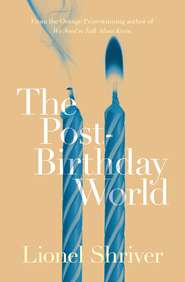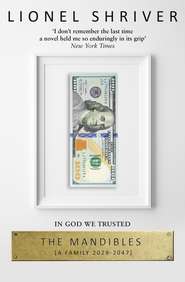По всем вопросам обращайтесь на: info@litportal.ru
(©) 2003-2024.
✖
Ordinary Decent Criminals
Автор
Год написания книги
2018
Настройки чтения
Размер шрифта
Высота строк
Поля
“Yes,” she said dryly. “So I don’t need to be congratulated every time I seem to realize the IRA is not an Individual Retirement Account.”
“Sorry?”
“You were saying: why you’re not dead.”
“I took care to be a thorn of equal length in everyone’s side. If I dismantled a Provo gelly bomb in a hijacked oil tanker, I’d be sure to loose an angry ram on a Save Ulster from Sodomy rally on the weekend. A balancing act of impartial disruption. I convinced each faction that I was a sufficient liability to its adversaries to keep about.”
“Were you ever interned?”
“Oh, aye. In the first instance, I was pleased. There was a time in West Belfast no one would trust you if you hadn’t been in the Kesh at least seven days. The second and third instances I could have skipped. Face-offs in a white room and a single mattress chained to the floor. A chair if you were lucky. Sleep if you were lucky. Water if you were lucky. I wasn’t lucky.”
“Do you still get harassed?”
“A certain Lieutenant Pim from Thiepval arrived on the scene of a rather wicked job I had already finished; he was charmed. That poor pillock actually did try to get me to join the army. He wanted to work with me. He liked me. He wanted to be my friend.”
“So?”
“I didn’t oblige, but Pim did. He fixed my computer file. Whenever I’m stopped at checkpoints now, they go back to their Land Rover. They come back smiling, and nervous. They shake my hand. They tell me, Safe home. They hope the delay hasn’t caused me any inconvenience.”
“What does it say?”
“Haven’t a baldy.”
Estrin eyed him critically. “I bet you loved being interned.”
“Answering the same question fifty times? Spread-eagled against a wall for six hours?” He considered. “Oh, aye. Those were some of the great moments of my life.”
“As opposed to now?”
His face shadowed, its parallels listed. “I came to realize I was entirely motivated by self-glorification.”
“You’re not anymore?”
“I have made repeated efforts at becoming a butterfly. Sure I’m as much of a worm as ever.”
“Does anyone do anything for anyone else ever?”
“I’ve seen it,” he admitted. “Singed passersby combing into McGrady’s for more survivors as the bar burned after the blast. But most heroism can be explained away as extended self-interest. To make allegiances is to preserve the race, the Catholics, your own family; however your lines are drawn. In which case I am biologically flawed. I do not ally. And I not only refuse to defend my people, but I’m out to destroy myself. I’m a failed mutation, a danger to the species which fortunately has not reproduced. I am a rocky, hostile island. Don’t wreck your ship on my shore.”
But the warning turned on itself. I am so wonderful that I know what’s wrong with me. Estrin was reminded of medieval monks who would whip themselves, feel righteous for whipping themselves, whip themselves for feeling righteous, only to feel righteous all the more and whip themselves again—an endless spiral of shame lapped by self-congratulation. In Ireland to run yourself down was to prove what a fine fellow you really were. “Self-criticism,” she observed, “is a form of preening.”
“You then, my swallow? Are you the world’s helpmate?”
“It’s all I can manage to avoid being a flat-out shithead. And people bungle so much doing ‘good,’ I figure it’s safest to do zip. I don’t hit children; I don’t litter; I also don’t work for the Peace Corps in Zaire. I try to have no effect on my environment whatsoever.”
“But doing nothing often has a great deal of effect. And I get restless. I have to do something even if at any distance I find myself comical.”
“So what do you do now?”
“I’m not nearly so colorful a character, I’m afraid. I’ve gone from prankster to community handyman. At the moment I’m negotiating for the release of two boys held at Secretary of State’s Pleasure. Rather than finagling whirlybirds to descend, I’m trying to get them up again; a woman in Armagh with a house near the heliport is losing her nerves. I’ve helped the area around my office organize against the rebuilding of an RUC station there, since the last thing that keeps you safe in this town is the proximity of the police. And we got blown up last time; it’s someone else’s turn.
“As for the disposal business, I have moved from defusing bombs to politicians. I set the North before myself like a chess problem: As long as the Brits are kicking doors in up the Falls at 6 a.m., firing after eleven-year-old joyriders, and tossing the odd innocent in the Crum without charge, the IRA will flourish; as long as the IRA flourishes, so will the UVF, UFF, and everything else beginning with U. As long as paramilitaries thrive, the troops stay; as long as the troops stay, paramilitaries thrive: a perpetual-motion machine that slows only from the physics of exhaustion.”
“I have never been anywhere with such a plethora of neat formulations about itself.”
“How to get the troops out without leaving behind a month of Bloody Sundays? Next to the North, chess is Snakes and Ladders.”
“So this is the game you play now with Angus MacBride.”
She thought he’d be pleased she’d recognized his friend at the distillery, for they’d not been introduced. Instead, he snapped, “In reference to my current work, you are not to mention anyone’s name in public under any circumstances. Understood?”
Estrin rolled her eyes. “Melodrama.”
“Drama,” he corrected. “You Americans have the hardest time getting it through your heads this is not a TV show.”
“Spare my countrymen for an evening and just insult me.”
“I expect you to keep your mouth shut. Straight enough?”
“Quite. I’m suddenly remembering an appointment later tonight.”
“If you can’t take a little flak across a table, you should keep the date.”
“Ah—Farrell,” she sighed. Sometimes the best way to win is to quit; one hand clutched her napkin, a white flag. “Listen, this isn’t my country and I do put my foot in it. I actually asked a Catholic at the entrance to Sandy Row whether he sympathized with the Provos. The walk was crowded and he looked at me sidelong and said, Some other time. I felt like a twit. I don’t know the rules yet, and on a second dinner certainly don’t know yours. I’m sorry I used anyone’s name and I won’t again, but please don’t rub my nose in it or I really will go home. Because I try, but I slip and some days forget if Molyneaux is UUP or OUP, or especially why that matters. Some days I wake up, I can name the number of my house but not what continent it’s on, the day of the week but not the year. I have too much to remember and more to forget—I need a little leeway.”
“Tenderness,” Farrell corrected, taking one hand from her forehead, the napkin from the left.
“How,” she faltered, for Estrin routinely steadied herself by being inquisitive. “How did you learn to do it? Dismantle bombs?”
“By one of the oldest traditions in the world,” said Farrell. “I apprenticed myself.”
When Farrell paid his membership to Linen Hall, he hardly expected to check out The Beginner’s Guide to Bomb Disposal, but he had to start somewhere and had always taken refuge in libraries. Surprisingly, he did dig up The Anarchist’s Cookbook, full of detailed diagrams on how to construct a book trap, loose-floorboard trap, ballpoint-pen trap—mere doddles. Sure, for a price he could have scored an Explosive Ordnance Disposal manual from the Brits, but this was before Lieutenant Pim, and Farrell’s army connections were understandably slim; before Whitewells, and his pocketbook was slimmer. So his discovery of Device proved a promising, if aggravating, find. Its author, Corporal Porter Edwards Bream, was a veteran of the North Africa campaign from the Second World War, where he’d defused land mines for the Allies. Brutish things, they didn’t apply. But his last term of service was in Northern Ireland. Funny, though nearly brand new, in a few months the book had already achieved that paperweight quality most published works are destined for—the kind of volume used to prop up film projectors or balance the legs of tables. Farrell took it home, and in all the years since the library had never requested its return.
Porter Edwards Bream was of Anglo-Irish stock, one of those sonorous codgers, you could tell by the flyleaf, who never went by less than all three names. Device was an essay. Farrell bristled at Bream’s pretensions to philosophy, but had to admit that for a vanity press the writing was sharp. “A device is a device,” Porter Edwards began. “Remember: big presents come in small packages.” It was an odd ragbag of tidbits, stories, practical advice about the importance of paper clips. “Always be on the lookout for surprise,” he suggested, “but do not flatter yourself you will see it in time. If you did, it wouldn’t be a surprise, now would it?” Porter Edwards saw bomb disposal as metaphor. In the end, he said, the trick was all internal. What would destroy you, as in any Greek tragedy, would be your own character. With booby-trapped bombs in the North, you would be hung by your own predictability—like the boys who were blown away by a pressure switch triggered by the ripping down of slanderous, anti-British posters on a gable wall. You had to overcome yourself, become larger, so you would cease to be manipulated by what you were like. And devices taught humility and respect. Farrell gagged. Whole chapters read like reruns of Kung Fu. “On Immortality and Arrogance” particularly got up his nose: “If you believe you’re immortal you probably think you’re special. You’re not,” Bream wrote flat. “You’re a dummy. Everyone thinks that. It’s only the rare fellows who grasp they can die who have a clue.”
Though by all indications Porter Edwards Bream was a whopping pain in the arse, Farrell needed tutelage, and traced Corporal Bream to the small Yorkshire town of Beverly. At the first pub he hit, Porter’s name worked a treat. “Watch yourself, now,” Farrell was forewarned. “Bream’s a touch of the second sight. Funny—creepy-funny. Might not like what he sees.”
“Bollocks,” said Farrell.
It took an hour to escape all the embellishments and cautions. Christ, the last thing anyone from Ulster hunted was another myth. And Farrell knew how to decode these fables by now: Porter Edwards Bream was an opinionated, abusive drunk. Locals indulged him from their own need, their pitiable internal poverty. Their awe was detestable. Their patience was detestable. They tolerated the corporal’s endless boozy blithering just to have someone to talk about.
He found Bream in a palatial house tended by two doting women whose relation to the man was obscure. An enormous, cigar-fogged old gout, he was not surprised by Farrell’s visit, or particularly curious. For a spindly Catholic to have sought him out all the way from Belfast seemed perfectly reasonable. He was dead senile, and through the afternoon kept falling asleep.
They despised each other straight off. “If there’s anything I can’t bear,” Porter announced not two minutes into their acquaintance, “it’s one more sod’s decided he’s self-destructive. Your sort’s problem: you’re not self-destructive enough! Little better at it and we’d be rid of you! Blast it, know how easy it is to die? If you can’t manage to stick your head in an oven, what kind of nincompoop are you?” Porter slammed down a full liter gauntlet of single malt, and the duel began.
“If we’re talking sorts,” Farrell started in, “why don’t we move on to yours: the fat, spoiled fraud. You fill out a bar. You rant through lulls in conversation, so the lot can lap their beer. Sure at the Rose and Crown didn’t they wax eloquent on Porter Edwards Bream. Naturally that delights you. But without you they’d find some other puppet. They use you—you’re to be wise, to be anecdotal, to be merciless. They make you wise, they feed you lines, they allow you to be merciless. Your audience demands it, all your orneriness and declarations and drink. A retired army corporal with stories. It’s trite. You’ll cough the same tales till you die, like phlegm. In the end, you’re their creature. And you think differently. That’s what’s so paltry and sad.”
“I don’t think in those terms at all, who is whose creature. You’re sick, man. You’ll do a lot of damage thrashing about if you don’t get hold of yourself. It’s always the, quote, self-destructive, do they ever so much as bump their own elbows? Anything but! Oh, the self-destructive, they go for the rest of the world at the throat. Look at you! Trying so hard to hurt my feelings there’s sweat in your hair.”











